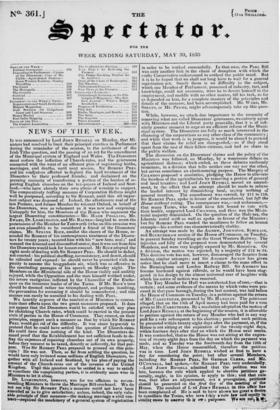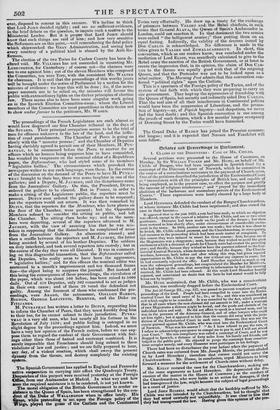NEWS OF THE WEEK.
We heartily approve of the resolution of Ministers to concen- trate their efforts upon the two great measures proposed. It does not appear that the Dissenters would be satisfied with any plan for abolishing Church. rates, which could be carried in the present state of parties in the House of Commons. They cannot, on their principles, support such a measure as that by which Sir ROBERT PEEL would get rid of the difficulty. It was sheer hypocrisy to pretend that he could have settled the question of Church-rates.
He could have done nothing of the kind. The Dissenters de- mand proof that the Establishment has not sufficient funds to de- fray the expenses of repairing churches out of its own property, before they consent to be taxed, directly or indirectly, for that pur-
pose. Was Sir ROBERT PEEL prepared to proceed on this prin- ciple? He was not. Then, so far from settling the question, he
would have only irritated some millions of English Dissenters, to- gether with all Ireland and Scotland, by his plan of paying the amount of the Church-rates out of the revenue of the United Kingdom. Until this question can be settled in a way to satisfy or conciliate the complaining parties, it is evidently more wise in Ministers to let it alone.
Dr. LUSHINGTON, however, was far too officious in recom- mending Ministers to throw the Marriage Bill overboard. We do not see why Sir ROBERT PEEL'S measure could net have been amended so as to give satisfaction; unless, indeed, the only valu- able principle of that measure—the making marriage a civil con- tract—require(' the machinery of a general system of registration in order to be worked successfully. In that case, the PEEL Bill was only another link in the chain of deception with which the crafty Conservative endeavoured to enthral the public mind. But it is to be hoped that we shall not long have to wait for a general registration act. Surely there is no difficulty in the subject, which one Member of Parliament, possessed of industry, tact, and knowledge, could not overcome, were be to devote himself to the employment, and meddle with no other matter, till his task, so far as depended on him, for a complete mastery of the principles and details of the measure, had been accomplished. Mr. 'WARD, Mr. Sum% or Mr. PRYNIE, might advantageously take up this ques- tion.
While, however, we attach due importance to the necessity of removing what are called Dissenters' grievances, weentirely agree with Ministers and the Liberal party generally, that it is of infi- nitely greater moment to urge on an efficient reform of the Muni- cipal system. The Dissenters are fully as much interested in the cleansing of the corporations as any other class of the community; and while that work is in progress, it would be absurd to pretend that their claims for relief are disregarded,—as if they stood apart from the rest of their fellow-citizens, and had no share in the public welfare.
The discussion on the Dissenters' claims and the policy of the ' Ministers was followed, on Monday, by a wearisome debate on agricultural distress; which ended, as these debates uniformly terminate, in a division that tells neither one way nor the other, but serves sometimes an electioneering purpose. The Marquis of CHANDOS proposed a resolution, pledging the House to alleviate the burdens of the agriculturists by removing a portion of general and local taxation ; and Lord Jolts; RUSSELL moved an amend- ment, to the effect that an attempt should be made to relieve the landed interest by diminishing local, saying nothing of general taxation. The amendment was carried, by 211 to 150. Sir ROBERT PEEL spoke in favour of the amendment, but left Me House without voting. The consequence was,—not unforeseen,— that many Tories, who would have felt bound to vote with their leader, supported Lord Ciamsnos, and thus was the Minis- terial majority diminished. On the question of the Malt-tax, the Liberals voted with as well as spoke in favour of the Minister; but Sir ROBERT PEEL wanted the manliness to follow an honest example—his conduct was characteristically shabby. An attempt was made by the AGNEW, JOHNSTON, SINCLAIR, and BUCKINGHAM section of the House of Commons, on Tuesday, to prevent Sunday travelling on the Great Western Railway. The injustice and folly of the proposal were demonstrated by several Members, and were very happily exposed by Mr. ROEBUCK. On a division, the motion was rejected, by a majority of 212 to 34. This decisive vote has not, however, discouraged the fanatics from making similar attempts; and Sir ANDREW AGNEW has given notice that he shall move to insert a clause to the same effect in the Birmingham and London Railway Bill. Sir ANDREW has become hardened against ridicule, or he would have been stag- gered in his design by the almost universal roar of laughter with which his notice of motion was received.
The Tory Member for Hull was not elected free of cost,—that is certain ; and some evidence of the means by which votes were pro- cured in that pure borough, during the last contest, was laid before the House of Commons on Tuesday, in a petition against the return of Mr. CARRUTHERS, presented by Mr. HANDLEY. The petitioner alleged, that on the 13th of April money had been paid for a vote given to Mr. CARRUTHERS. By a resolution adopted on the motion of Lord JOHN RUSSELL at the beginning of the session, it is allowable to petition against the return of any Member who had in any way
paid for a vote subsequent to his election ; provided such petition
be presented within twenty-eight days after the payment, or, if the House is not sitting at the expiration of the twenty-eight days, within fourteen days after that on which the House next meets. It was contended, that as the House was not sitting at the expira- tion of twenty-eight days from the day on which the payment was made, and as Tuesday was the fourteenth day from the 12th of May, when the House reassembled, therefore the petition was in time. Lord JOHN RUSSELL wished at first to have a day for considering the point; but after several Members, including Sir ROBERT PEEL, Sir GEORGE CLERK, and Mr. O'CoNNELL, had spoken,—Sir ROBERT PEEL very undeeidedly. —Lord JOHN RUSSELL admitted that the petition was too late, because the rule which applied to election petitions ge- nerally, ought, in his opinion, to apply to this ; and that rule
was, that after an adjournment, not a prorogation, petitions
should be presented on the first day of the meeting of the House. The conduct of L-rd Jous Russsm. in this affair has been complained of. He is said to have shown too great a desire to conciliate the Tories, who inva Itihy rrain law and equity irs similar cliaqs to4al.Wcr th•ir OW I purposes. WO are not! klut ever, disposed to concur in this censure. We incline to think that Lord JOHN decided rightly ; and see no suflicient evidence, in the brief debate on the question, to impute such a motive to the Ministerial Leader. But it is proper that Lord JOHN should know that such things are said of him; and how very sensitive the Reformers are on this point,--well remembering the fatal policy which shipwrecked the GREY Administration, and seeing how every courtesy of a political kind is abused by the Anti-Re- formers.
The election of the two Tories for Carlow County has been de- clared void. Mr. VILLIERS has not succeeded in unseating Mr. LUSH I NGTON, for Canterbury : of course not—the chances were ten to one against him ; out of the eleven Members who composed the Committee, ten were Tory, with the consistent Mr. WALTER for chairman. It is said that the proceedings of this worthy junta will be brought under the notice of Parliament by a motion for the minutes of evidence: we hope this will be (lone; for, if the news- paper accounts are to be relied on, the minutes will favour the public with extraordinary lights on the darker principles of election law. There seems also to have been some singular work going on in the Ipswich Election Committee-room; where the Liberal members of the Committee are most punctilious in their desire not to show undue favour to the petitioner, Mr. WASOIY.



























